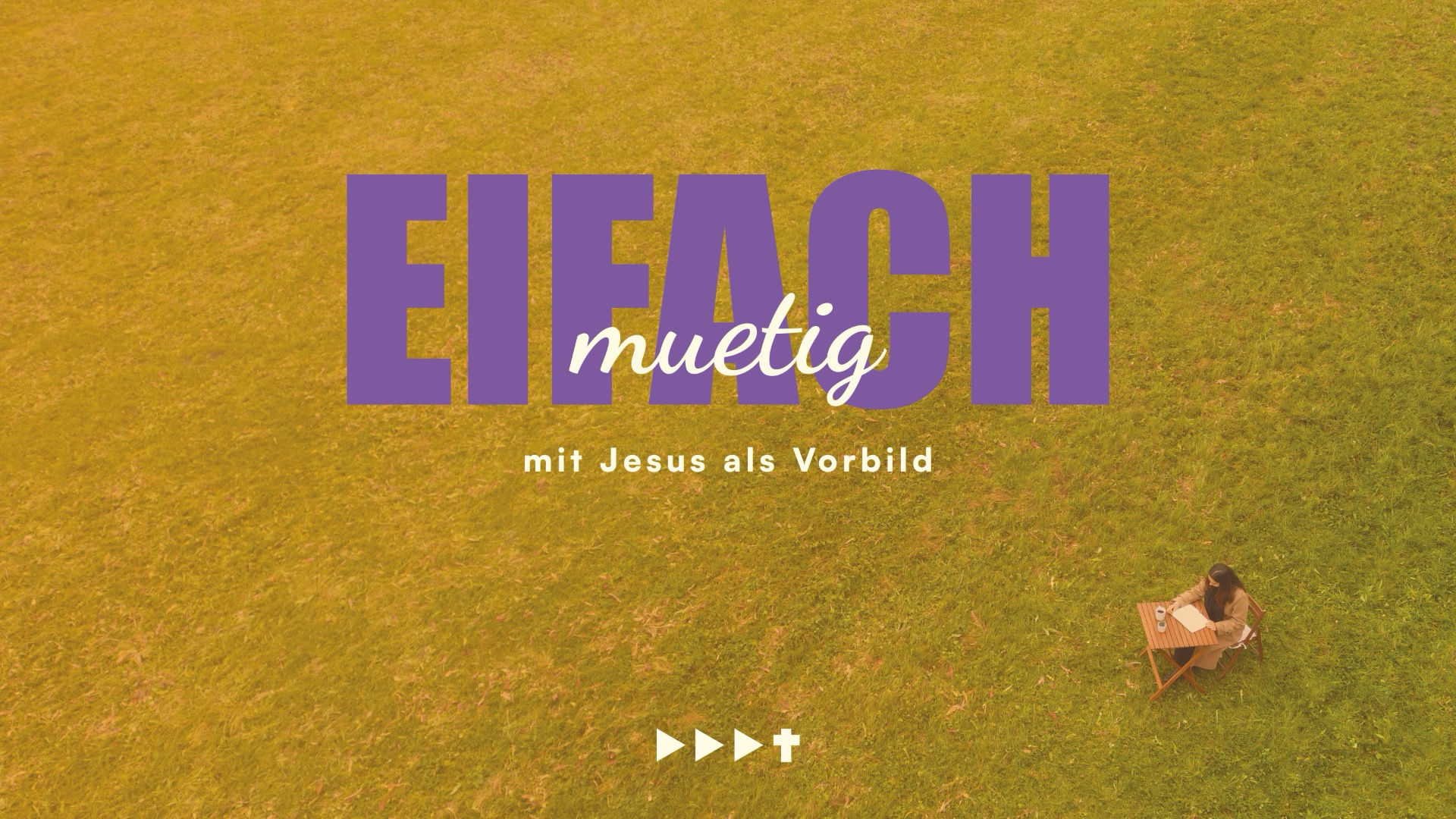The sweet yoke
Series: EIFACH muetig – with Jesus as a role model | Bible text: Matthew 11:25–30
Jesus invites us to come to him with all our tiredness and burdens and to find true rest with him. This rest does not come through performance or fulfilment of the law, but through trust and personal fellowship with him. His «yoke» is not oppressive, but carried by mercy and love – it suits us. Those who entrust themselves to him learn to live a life of freedom, gentleness and inner peace.
Last Sunday I preached a sermon on suffering. Towards the end, I read the invitation of Jesus Christ from the Gospel of Matthew. Today I would like to go into this biblical passage in more depth.
Jesus» prayer
These three verses, which begin with «Come unto me…», are famous. But the passage begins three verses earlier with a prayer by Jesus Christ. This is exactly where I would like to start. Jesus prayed often, and this tells us a lot about him and his relationship with God the Father. «Then Jesus said the following prayer: «O Father, Lord of heaven and earth, I thank you that you hide the truth from those who think themselves so clever and wise. I thank you that you reveal it instead to those who have a childlike mind» (Matthew 11:25 NLB). I always find it fascinating how my children imitate me and my wife. Hosea, our eldest, knows exactly what I do and how I do it. At home, I’m responsible for the salad dressing. He now knows all the ingredients for my salad dressing by heart! So he always asks: «What do I need?» and I reply: «What do I need?» Then he adds an ingredient that is still missing! Jesus learnt from his Father like my children learn from me. He learnt by living close to his Father and listening to his voice. By watching and imitating. Adults often strive for greatness. We then consider ourselves to be particularly wise and clever. This is not necessarily linked to a level of education. What does it mean to have a childlike mind? It is trusting, trusts the parents to do everything and lives from the experience that the parents mean well. This prayer shows that God’s standards are different. Not those who think they are clever and wise, but those with a childlike disposition. But why? For this reason: «Yes, father, that’s what you wanted!» (Matthew 11:26 NLB). For they put God first and not themselves.
Jesus continues to pray: «My Father has given me authority over everything. No one really knows the Son except the Father, and no one knows the Father except the Son and those to whom the Son wants to reveal the Father» (Matthew 11:27 NLB). Without Jesus Christ there is no knowledge of God! Jesus has been given authority over everything. But what does this «everything» mean? It means access to eternal life (John 3:35), judgement (John 5:19ff), acceptance for salvation (John 6:37), authority over the church (John 10:29), completion of God’s plan of salvation (John 13:3) and he is the bringer of salvation to all people (John 17:2).
Come to me, everyone…
In his prayer, Jesus makes it clear that he is the representative of God. He and the Father are one (John 10:30). Therefore he says: «[…] Come to me, all you who are weary and carry heavy burdens, and I will give you rest. Take my yoke upon you. I will teach you, for I am humble and kind, and your soul will rest with me» (Matthew 11:28–29 NLB). Coming means believing (Acts 16:31), receiving (John 1:12), eating (John 6:35), drinking (John 7:37), going through a door (John 10:9), opening a door (Revelation 3:20) and accepting the undeserved gift of God, eternal life (Romans 6:23). This invitation is not about accepting any particular teaching, hearing words from Jesus, but it is about entering into a personal fellowship. The other things are a result of this. The list above shows what «coming» means – it is first of all about fellowship. The object of faith is Jesus Christ – his person!
Let all who are weary come. This refers to all those who labour with physical and mental effort. It is about all those who seek fellowship with God in vain, who long for God’s kingdom, acceptance by God and do not find it. Yes, ultimately it is about all those who set themselves the wrong goals in life. What are you tired of? From the pressure to succeed at work? Your children? Your flat/house, which is so busy? From seeking recognition on social media? Perceptions in society? What is it with you?
«[…] Come unto me, all ye that are weary and heavy laden, and I will give you rest» (Matthew 11:28 NLB). When we come, Jesus Christ promises us rest. But two words are particularly important: «I» and «give»! Rest is a gift that can neither be earned nor acquired. It has always been God’s nature to give it. «For I will give plenty of drink to those who are thirsty and satisfy those who are weak from hunger» (Jeremiah31:25 NLB). This rest is twofold: on the one hand here on earth, and on the other in the perfect, eternal kingdom of God. This rest does not take away everything, but in the midst of suffering, Jesus strengthens us. As described in the wonderful Psalm 23: «He gives me strength. He shows me the right path for the sake of his name. Even when I walk through the dark valley of death, I am not afraid, for you are at my side. Your rod and staff protect and comfort me. You set a table for me before the eyes of my enemies. You receive me as a guest and anoint my head with oil. You shower me with blessings» (Psalm 23:3–5 NLB).
Taking the yoke upon yourself means following Jesus. To learn from him in a humble and friendly atmosphere. This should also be a characteristic of followers of Jesus: Humility and kindness. The image of the yoke was a familiar one. The Pharisees, the religious leaders of the time, spoke of the yoke of the Torah. By this they meant the heavy burden of the Jewish law with all its 248 commandments and 365 prohibitions. Jesus» reproach to this group of men was that they imposed a heavy burden on the people (Matthew 23:4). But Israel was never able to bear this burden (Acts 15:10). In contrast, the yoke of Jesus Christ is rooted in mercy and love. I like the definition of mercy that Harry Graf gave in a sermon: Mercy is to have compassion when someone is to blame.
The burden is sweet
Jesus ends his statement with: «For my yoke fits you perfectly, and the burden I lay on you is light» (Matthew 11:30 NLB). Is it really that easy? In other incidents, Jesus also says that those who want to follow him should give up their family, their possessions and even their own lives! These calls to leave everything behind are often seen as a great loss. But Jesus says «my yoke». We are all under a yoke that crushes us. As a rule, it is precisely those things that we do not want to lose under any circumstances that are the source of moral, physical, emotional, financial or other burdens. A burden remains a burden. Jesus does not free us from it. But his burden is light because it is taken on voluntarily, willingly and in the knowledge that Jesus never burdens us beyond our strength. This is practical discipleship.
However, the yoke is not an instrument of torture, but enables and facilitates the animals» labour. It does not allow any obstinacy. Taking the yoke upon oneself means resolutely doing one’s will, just as we pray in the Lord’s Prayer: «Thy will be done». This decision brings peace into our lives. The fact that the burden is light does not mean that there are no problems. But we are yoked together. «The worst mistake a believer can make is to try to carry the burden of life under a single harness. God never wanted anyone to have to carry his burden alone. That’s why Jesus only deals with yokes! A yoke is a harness for two, and the Lord himself wants to be one of the two. He wants to share the work of every difficult task with us. The secret to victory and peace in the Christian life is found by discarding the single harness of ’self» and accepting the liberating yoke of the Lord» (John Henry Jowett). The yoke of Jesus Christ is mild. To put it bluntly, it could also be said to be sweet. Because the yoke of Jesus (discipleship) leads to freedom with God. This is how Martin Luther summarised it: «A Christian life is a blessed and joyful life, and the yoke of Christ is gentle and sweet» (Martin Luther). The peace that Jesus gives us is his peace. «I am leaving you a gift – my peace. And the peace that I give is not like the peace that the world gives. Therefore, do not worry and do not be afraid» (John 14:27 NLB). How do I get there? By coming to him, to his person and being with him. That’s how I get the rest that gives my heart peace!
Possible questions for the small group
Read the Bible text: Matthew 11:25–30
- What is making you tired or weighing you down at the moment? Are there areas of your life where you feel exhausted – physically, emotionally or spiritually?
- How do you experience Jesus» invitation: «Come to me… I will give you rest»? Is this more of a comforting promise for you, a challenge or difficult to accept?
- What does it mean for you to have a «childlike disposition» – in faith and in everyday life? Which characteristics of a child (e.g. trust, dependence, authenticity) help you to come closer to God?
- What do you understand by the «yoke of Jesus» – and how does it differ from other burdens in your life? Are there things that you should perhaps let go of in order to come under the yoke of Jesus?
- How can you learn from Jesus in your everyday life (Matthew 11:29)? What habits, spiritual exercises or decisions help you to stay with Jesus?
- In which moments have you experienced God’s rest or peace in a very practical way? What has helped you to entrust yourself to Jesus in such situations?



